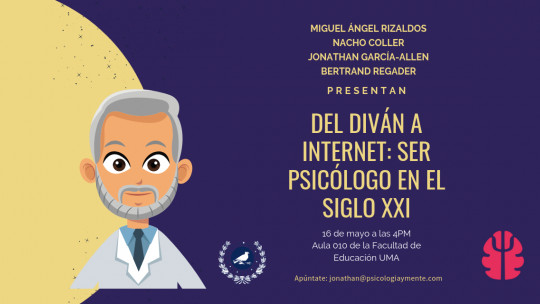“The problem with the world is that the stupid are sure of everything and the intelligent are full of doubts – Bertrand Russell”

A few months ago I held a workshop on the Organizational Psychologist for the students of the University of Girona, in which I had several surprises, but the most surprising was the confusion of the psychology students about our profession.
Student: “But what about you in the companies you do? Why have they already told us that to select personnel it is not necessary to study Psychology and that firing people must be horrible!”…. I think it’s sad that our image is still this.
What does an organizational psychologist do?
However, the development of the workshop was good and I think I have convinced more than one that a Organizational Psychologist He is not the one who fires and selects personnel. An Organizational Psychologist is the Clinical Psychologist for Companies and Workers! It is the one who builds bridges between workers and companies, the one sensitive to the needs of Entrepreneurs and Employees, the grease of a perfect gear where Entrepreneur and Employees form a single machine united towards a common goal!
We have already read on many occasions that the factor that can make an organization stand out is the staff that makes it up. The quality of employees an organization, your enthusiasm and satisfaction at work, your experience and your feeling of receiving fair treatment affects the company’s productivity, consumer service, its reputation and its survival: The main factor is knowing and knowing how to manage the patterns of communication and relationship of employees and their interactions with the company or clients. Taking this reflection into account, only people can make the competitive difference of an organization (I know, more of the same…).
Therefore, managers have to understand the People management issues, no one can ignore what motivates their employees, what expectations they have in their workplace, what training and competency requirements they have to cover, what their objectives are and what is expected of them, among other very important aspects such as knowing the type of relationships between employees. Our mission is to train them and develop the necessary tools to make this possible.
For this reason, in the face of any problem or change that occurs within the organization and therefore in the face of employee involvement, the mission of the Organizational Psychologist will consist of guiding the execution of their functions by following the same steps that a Clinical Psychologist could carry out when treating a patient, the difference between the two will simply be eradicated in the work model to be followed and the tools that will be used.
Clinical Psychologist vs. Organizational Psychologist
In both cases, the process for any problem will be the same and therefore we will always identify the following phases:
- Definition of the problem or need
- Evaluation of the people involved: tests adapted to each circumstance
- Preparation of a diagnosis
- Proposed Solution
- Follow-up
Let’s see, for example, the comparison of a treatment of Depression with a case of Order delivery delay:
1. Definition of the Problem or Need
- Depression: The patient shows stages of anguish, sadness, apathy and does not want to leave the house. These symptoms manifest themselves from job loss. Due to this, the family relationship is being harmed due to continuous parental arguments. The problem has been present for 3 months and 1 month ago the patient started taking antidepressants (a request made by the patient or his family).
- Order delivery delay: Due to the summer season (June-September), an increase in the number of orders has been detected, which has produced an overload of work in the Commercial Administration Department, which is generating different problems such as serving orders to customers after deadlines, lack of attendance and bad work environment such as continuous discussions between the Head of Administration and the rest of the employees (a demand that any superior of the Company or the Head of Administration herself can make about the need to hire a new worker).
2. Evaluation of People Involved (tests)
- Depression: Beck Depression Test and Family-Personal Interview.
- Order delivery delay: Interviews with Employees and Superiors, Personal Interviews with Candidates (personnel selection), Personality Psychotechnicians (personnel selection) and Work Environment Questionnaire.
3. Preparation of the Diagnosis
- Depression: Acute depression due to exogenous factors (job loss).
- Order delivery delay: Considerable increase in workload due to the peak of work derived from the summer season. Tension in relationships due to lack of definition in roles.
4. Solution Proposal
- Depression: Family Therapy for parents and children to provide sufficient resources to adapt and facilitate grief over job loss. Development of self-esteem through cognitive-behavioral tools practiced in individual therapy that allow greater effectiveness in the search for a new job.
- Order delivery delay: Personnel Selection (summer reinforcement) and Job Description (to help in defining functions).
5. Tracking
- Depression: Weekly or biweekly monitoring of the measures carried out and strategies defined in each session (it will depend on the model in which we work). Ultimately, pass the Beck Test again and assess her current situation with the patient.
- Order delivery delay: Definition of a welcome plan for the new incorporation to achieve good follow-up and fit into the organization. After 6 months (for example and trying to replicate the same circumstances), take the Work Environment Questionnaire again to assess the adequacy of the measures adopted (such as the job description).
Our work goes beyond our contract, our work must be faithful to our values and ideals of helping people, it does not matter if you practice Psychology in a clinical or work context, it does not matter if you treat the people who pay you. the payroll or those to whom you pay the payroll. Our work has to contain the objective of helping them to be happier, more effective, to achieve a common good that keeps all the parts together, whether in a family or a company, the whole will always be greater than the sum of its parts…









